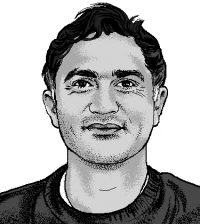Two loves
For more commentary on this week's readings, see the Reflections on the Lectionary page, which includes Villegas's current Living by the Word column as well as past magazine and blog content. For full-text access to all articles, subscribe to the Century.
“Little children, let us love, not in word or speech, but in truth and action.” The author of 1 John invites us to put our love into action—to love with our lives. Love is a commandment: “love one another, just as [Jesus] has commanded us.” If we follow this commandment to love, then we are in communion with God: “All who obey his commandments abide in him, and he abides in them. And by this we know that he abides in us, by the Spirit that he has given us.”
Sebastian Moore summarizes this passage as “no love of neighbor, no love of God.” We don’t know how to love God without our neighbor. We can say all we want about how much we think about God, how much we love God, how often we pray and worship God—but all of that matters insofar as it has something to do with our relationships with our neighbors. “How does God's love abide in anyone who has the world's goods and sees a brother or sister in need and yet refuses help?”
Love of God and love of neighbor flow together. These two loves are one. Moore puts it this way:
The Christian statement “I love God” is the statement that I am touched by the God who is love and so am constituted “a loving person,” a person reshaped by essential love and so made loving in the totality of my human, social situation. Thus “not to love someone” is quite simply, to be without the love of God.
To neglect our neighbors is to live without God. To refuse to love is to cut ourselves off from the flow of God’s love through us.
In early March, U.S. Immigration and Customs Enforcement coordinated law-enforcement raids throughout the country, arresting more than 2,000 people. These included Max Villatoro, a Mennonite pastor in Iowa, who was deported to Honduras. Alejandro Mayorkas, deputy secretary of Homeland Security, referred to these people as “convicted criminal aliens who pose the greatest risk to our public safety,” adding that “communities around the country are safer” because of their apprehension.
Pastor Villatoro was not a danger to public safety, nor is this country safer without him. Instead, his congregation is now without a pastor, his wife is without a husband, and his children are without a father.
“Each day, families in our church communities are being torn apart,” says Iris de León-Hartshorn, the director of transformative peacemaking for the Mennonite Church USA. “Children are left with one parent or, in other cases, left as orphans and put into foster care.” To borrow Mayorkas’s words, these raids pose a great risk to our public safety. For many of us who are Latino/a, ICE endangers our households and communities.
“Our call is to speak and empower the most vulnerable,” writes de León-Hartshorn. “Our call is to speak truth to unjust systems and ideologies that are racist.”
These deportations are examples of how not to love neighbors, and therefore how not to love God. No love of neighbor, no love of God.
The good news is that there are many in this country who work against ICE’s anti-neighbor strategy. De León-Hartshorn lists people who love with “truth and action,” people who obey Jesus’ commandment:
Madeline Maldonado, a pastor from Fort Myers, Florida, who works tirelessly with immigrants in her congregation and at one time had to say goodbye to half the members of her congregation within a year due to deportations. Anton Flores, who founded the Alterna community in LaGrange, Georgia to provide a myriad of services for immigrants, from detention center visits to advocacy. Tina Stoltzfus Schlabach from Shalom Mennonite Church in Tucson who ministers to immigrants at the Florence Detention Center and supports Casa Esperanza, a home that offers people who have just been released from detention a safe place to stay until they can be reunited with others or find a place to live on their own. Sarah Jackson from Denver who uses her apartment as a place of hospitality and hosts people who are visiting families in detention and immigrants that are released and in transition. Her home has become a place of respite called Casa de Paz. Lupe Aguilar, who pastors Iglesia Menonita Rey de Gloria on the border in Texas and ministers to the undocumented by providing everything from basic household needs to advocacy. These are just a few of the saints among us.
When we think about our neighborhood and community, our city and state, our country and world, 1 John focuses our attention with a poignant question for all of us who say that we love God: “How does God's love abide in anyone who has the world's goods and sees a brother or sister in need and yet refuses help?”






